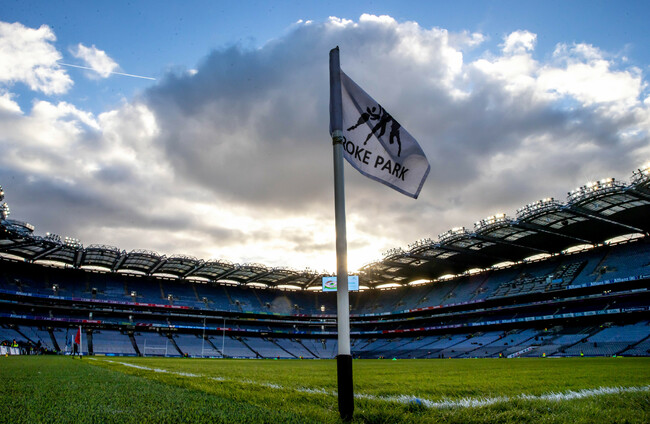LAST UPDATE | 12 Apr 2023
Updated at 13.19
IRELAND AND the United Kingdom submitted their final bid to host Euro 2028 today, with Croke Park absent from the list of stadiums that will be utilised.
The venue has historically been used for GAA matches but served as the home to the Irish soccer and rugby teams while Lansdowne Road was under redevelopment during the late ’00s.
Last month, it was confirmed that permission had been granted for both Croke Park and Casement Park to be included in a formal bid for the 2028 Euros.
Casement Park in Belfast, which is currently being redeveloped and is due to have a 34,500 capacity once completed, has made it onto the final list of 10 stadiums, whittled down from an original shortlist of 14, despite reports in December that Uefa had raised concerns over its inclusion.
Sports minister Thomas Byrne told The Hard Shoulder on Newstalk that Uefa felt Dublin was too small a city to host games at two different stadia.
“We wanted Croke Park and the Aviva, but from a Uefa point of view, it was felt that two in a city the size of Dublin would not be ideal for the bid”, said the minister. “We did push hard for the two in Dublin, but it was ultimately decided we would not proceed with Croke Park. That is simply to do with the way the Uefa process works, and London is the only city where two stadiums will be proposed for the bid.”
Minister Byrne also confirmed that the British government have committed to significant investment to develop the currently derelict Casement Park.
“Obviously there is substantial work to be done there, and the British government have given a guarantee in relation to that”, he said.
The other stadiums included are the Aviva Stadium, Dublin (51,711), Hampden Park, Glasgow (52,032), Villa Park, Birmingham (52,190), St James’ Park, Newcastle (52,305), Everton Stadium, Liverpool (52,679), the Etihad Stadium, Manchester (61,000), the Tottenham Hotspur Stadium, London (62,322), Principality Stadium, Cardiff (73,952) and Wembley Stadium, London.
To be eligible for inclusion, stadia were required to have a net seating capacity of more than 30,000, which meant Northern Ireland’s Windsor Park among others did not make the cut.
In addition to Croke Park, the Stadium of Light (Sunderland), London Stadium (West Ham), and Old Trafford (Man United) were the other stadia excluded despite featuring on last November’s provisional list.
The42 understands that GAA officials are pleased to see Casement Park included given the redevelopment of the Belfast venue is a key infrastructural aim of the association.
In part of a lengthy statement released this afternoon, FAI CEO Jonathan Hill did not address Croke Park directly while hinting at reasons for its exclusion.
“In all major bid processes, you start with a short list of stadia, and this is whittled down to a final agreed list in order to give the bid the best chance of success and reflects the streamlined nature of the tournament,” he said. “This bid started with 14 Stadia, and we now have our agreed final 10 which have been submitted. The Bid, with the exemption of London, is based on a ‘one city, one stadia’ principle and together we believe the list offers an array of superb stadia from across the UK and Ireland.”
The joint bid involving five associations is set to go up against Turkey, with Uefa due to vote on hosting rights in September.
An FAI release this afternoon outlined the perceived benefits of the bid, which they listed as follows:
- We predict UEFA EURO 2028 will generate cumulative socio-economic benefits of up to €3 billion (£2.6 billion) for our nations, €241 million of which will be generated in Ireland.
- Bid Partners have already invested or committed more than £500 million (€567 million) between 2019 and 2025 to improve and upgrade grassroots facilities – with the aim of expanding investment programmes as UEFA EURO 2028 approaches.
- A €51 million (£45 million) legacy fund will be invested to develop football and create additional legacies for grassroots football
- The tournament will help create positive long-term community impact through volunteering, tourism and other training opportunities that provide people with skills for life.
You can find out more about the bid in the official brochure here.
Updated at 18.04 with comments from Minister Thomas Byrne TD




